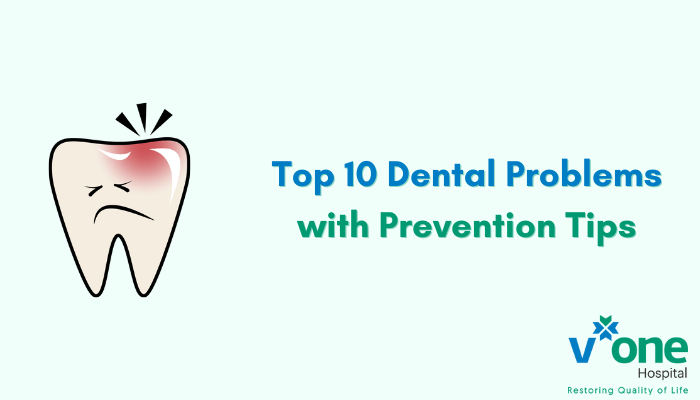Top 10 Dental Problems and How to Prevent Them?
Maintaining a healthy smile goes beyond the routine brush and floss. Your oral health is a gateway to overall well-being, and being proactive in preventing dental problems is key. In this guide, we’ll explore the top 10 dental issues people commonly face and equip you with practical tips to keep your pearly whites in top-notch condition.
1. Tooth Decay
Tooth decay is a common dental problem characterized by the gradual destruction of the tooth’s enamel, often caused by plaque buildup and the acids produced by bacteria in the mouth. If left untreated, it can lead to cavities.
Prevention Tips
Fluoride Treatment: Consider professional fluoride treatments, as fluoride helps strengthen enamel.
Limit Sugary Foods: Reduce the consumption of sugary snacks and beverages, as they contribute to plaque formation.
Regular Dental Check-ups: Routine dental visits allow for early detection and intervention.
2. Gum Disease
Gum disease, or periodontitis, is an inflammatory condition affecting the gums and supporting structures of the teeth. It progresses in stages, from gingivitis (mild inflammation) to more severe forms that can lead to tooth loss.
Prevention Tips
Effective Oral Hygiene: Brush, floss, and use an antiseptic mouthwash regularly.
Professional Cleanings: Regular dental cleanings help remove plaque and tartar.
Quit Smoking: Smoking is a significant risk factor for gum disease; quitting can improve oral health.
3. Bad Breath
Persistent bad breath, or halitosis, can result from poor oral hygiene, dry mouth, or underlying health issues. The dental problem can affect social and professional interactions.
Prevention Tips
Proper Oral Hygiene: Brush teeth, gums, and tongue to eliminate bacteria.
Stay Hydrated: Drinking water helps maintain saliva production, reducing dry mouth.
Regular Dental Check-ups: Dental professionals can identify and address the underlying causes.
4. Tooth Sensitivity
Tooth sensitivity involves discomfort or pain when teeth are exposed to hot or cold temperatures. It often occurs when the tooth’s protective enamel is compromised.
Prevention Tips
Use a Soft Toothbrush: Brush gently to avoid enamel erosion.
Desensitizing Toothpaste: Specialized toothpaste can help alleviate sensitivity.
Address Teeth Grinding: A mouthguard can protect teeth from grinding-related damage.
5. Tooth Erosion
Tooth erosion is the gradual loss of enamel due to acidic substances, including certain foods and beverages. It weakens teeth and can lead to sensitivity and cavities.
Prevention Tips
Limit Acidic Foods: Reduce intake of citrus, sodas, and acidic fruits.
Rinse Mouth After Eating: Swishing water after consuming acidic foods helps neutralize acids.
Wait Before Brushing: Wait 30 minutes after eating acidic foods to avoid enamel damage.
6. Oral Cancer
Oral cancer can affect various parts of the mouth, including the lips, tongue, and throat. Early detection is crucial for successful treatment.
Prevention Tips
Regular Screenings: Routine dental check-ups include oral cancer screenings.
Limit Alcohol and Tobacco: Excessive alcohol and tobacco use are major risk factors.
7. Cavities
Cavities are holes in the teeth caused by untreated tooth decay. The dental problem can lead to pain, infection, and the need for dental fillings.
Prevention Tips
Fluoride Treatments: Strengthen enamel with professional fluoride applications.
Moderate Snacking: Frequent snacking increases the risk of cavity formation.
Chew Sugar-Free Gum: Stimulate saliva production to neutralize acids.
8. Toothaches
Toothaches can result from various causes, including decay, infection, or gum disease. They are often characterized by persistent pain and discomfort.
Prevention Tips
Regular Dental Check-ups: Routine visits catch issues early, preventing the development of toothaches.
Good Oral Hygiene: Brushing and flossing are essential for preventing toothaches.
9. Missing Teeth
Missing teeth can result from various factors, including decay, trauma, or gum disease. It can impact oral function and aesthetics.
Prevention Tips
Protect Your Teeth: Wear a mouthguard during sports activities to prevent trauma.
Good Oral Hygiene: Regular care helps prevent decay and gum disease, reducing the risk of tooth loss.
10. Dry Mouth
Dry mouth occurs when there is insufficient saliva production, leading to discomfort, difficulty in swallowing, and an increased risk of cavities.
Prevention Tips
Stay Hydrated: Drink plenty of water throughout the day to maintain saliva production.
Limit Caffeine and Alcohol: These substances can contribute to dehydration and exacerbate dry mouth.
Wrapping Up
Understanding these dental problems and implementing preventive measures is crucial for maintaining optimal oral health. Regular dental check-ups, effective oral hygiene practices, and a commitment to a healthy lifestyle contribute to a confident and radiant smile throughout your life. Remember, your smile is an asset worth preserving!

